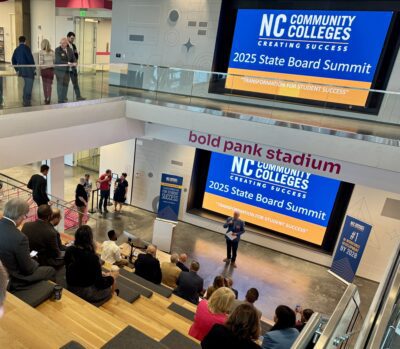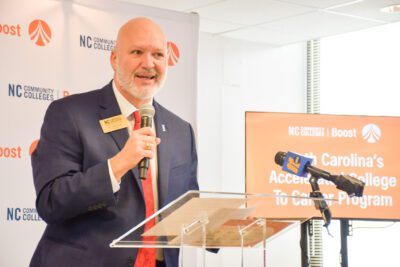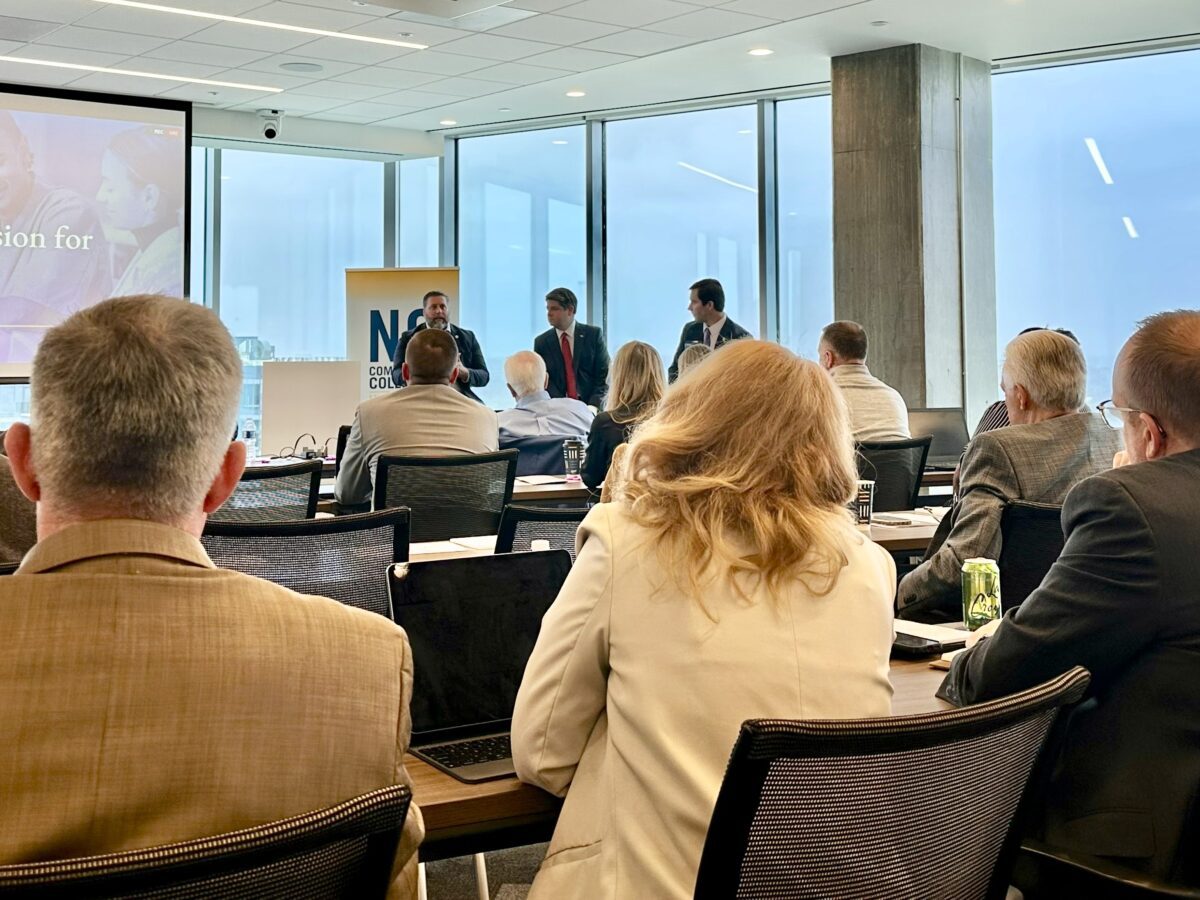
|
|
At the N.C. Community College Summit held this week in Raleigh, Alex Fagg, the vice president of government and external relations for the N.C. Community College System, spoke with two state lawmakers — Rep. David Willis, R-Union, and Sen. Brad Overcash, R-Gaston — both of whom have leadership roles on education and appropriations committees. The summit is kicking off a strategic planning process for the system.
“We’re not going to guess what they’re thinking,” said State Board of Community Colleges Chair Tom Looney in his opening remarks at the summit, which included elected officials, national and state leaders, industry partners, and other stakeholders. “We’ll hear from legislative champions about their vision, ideas, and support for the community colleges — as well as the challenges.”
Fagg described both lawmakers as “major champions for the community college system.”
“Their support is vital for our success,” he added.
![]() Sign up for Awake58, our newsletter on all things community college.
Sign up for Awake58, our newsletter on all things community college.
Why legislators want the system to act like a system
Fagg said to the legislators, “We hear a lot from the General Assembly about our community college system acting as a system.”
Willis has deep ties to the system. He formerly served on the state Board, is a proud graduate of Stanly Community College, has children who earned community college credits that will transfer to their university, and describes his family as a true proponents with a heart for the system.
Both when he was on the state Board and now as a legislator, Willis has believed that “we’ve got to stop thinking of ourselves as individual programs and really get to one system.”
“We love to talk about the Great 58,” Willis said referencing North Carolina’s 58 community colleges. “And I think that’s amazing because each of the 58 programs have an amazing footprint in their own community and the impact that they have from an economic development perspective, from an education perspective, just from an intrinsic value there, cannot be replaced.”
At the same time, Willis said, given the modern era and the challenges ahead, “we’ve got to start thinking more systematically in how we do things.”
He shared a story about an experience his son, Jackson, had. Jackson was trying to get into a public speaking class at South Piedmont Community College. The class was full, so he was offered other options that met his needs.
But what Jackson wasn’t offered, Willis said, was the opportunity to take the class he wanted at another community college.
“It shouldn’t be this is a South Piedmont student or this is a Central Piedmont student or this is a Stanly student,” said Willis. “This is a community college system student.”
Willis believes the community college system is well positioned to take advantage of what he called “headwinds.” He says this generation of students sees the value of community colleges.
“We’ve got a lot of opportunity,” said Willis. “We’ve got a ton of jobs that don’t require a four-year degree. We’ve got labor shortages across the state.”
“The community college system will and can change lives,” he said.
Willis noted four things the system could to do better:
- Continue to get the message out there about the value of community college;
- Work as a “more cohesive unit” to make it easier and quicker for students to complete;
- Cut through the red tape — if the goal is to get the student a job and the student gets the job without completing, then he said, there should be a way for that to count; and
- Find efficiencies and cut costs — in information technology, in human resources, and procurement, for example — to be more sustainable longer term.
Overcash said, “the goal here — at least from the General Assembly’s perspective — is for workforce and economic development.”
“We are going to have to work as a system,” he said. “The system can move at the speed of business and our Great 58 can come right along with that.”
“Without a systemwide approach,” Overcash said, “we are not going to get the swift action that we need to keep up to keep up with the demands of the current workforce and the current economic development needs in the state of North Carolina.”
Related reads
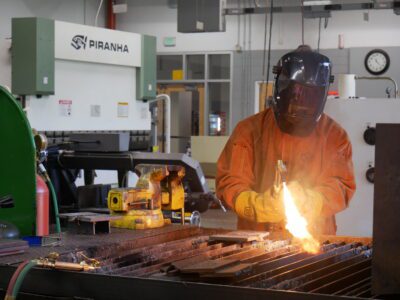
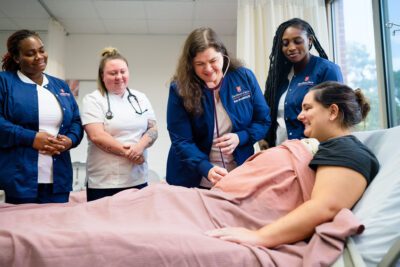
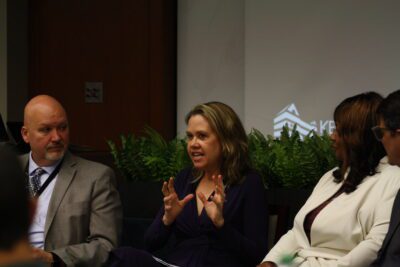
How legislators think about roles and responsibilities in the system
Fagg then asked the legislators about the roles and responsibilities of the system versus the state Board versus the local boards of trustees, both now and in the future.
“It’s a teamwork approach,” said Overcash, who previously chaired the board of trustees for Gaston College.
“I love our local community colleges,” he said, sharing that when local trustees hear about the need for “an integrated system, there might be a natural tendency to draw back a little bit to say ‘no, we don’t want the system office in Raleigh in good old Gaston County.’”
But Overcash doesn’t see it that way. He sees it as an opportunity to “bring up” each of the 58.
For example, Gaston College, Overcash said, is home to the Textile Technology Center. He called it “truly special,” with equipment paid for by industry that can create “the most highly dynamic and new age fibers in the world,” on par with what would be needed for U.S. Department of Defense contracts and other commercial applicability. The legislative staff from fiscal research recently visited, he said, and were blown away.
Over the years, the college has taken funding from their general budget to support the center, he said.
“Why?” Overcash asked. “Because we have an FTE mindset.”
The center, he said, is the research and development arm and the workforce training arm for the remaining textile industry in America.
“Are there a lot of FTEs going on over there? No,” he said. “If we look at it in that old mindset, we are never going to succeed.”
Overcash said there is a different, better way to look at market demand for the center: It is cutting edge, there is business interest, and there is ongoing, external financial support.
“What’s it going to take to get these Ph.D. and materials engineers into North Carolina to support that industry and go?” he asked.
“Let’s not hunker down and say that a systemwide approach harms our community college,” he said. “I think it’s going to lift our community colleges up so we can be laser focused on being what we need for workforce and economic development.”
“This is where you are going to get some commitments from the General Assembly,” Overcash said.
What legislators think it will take for NC to be No. 1 in workforce
Willis wants the state Board to embrace change, noting the state’s attainment goal for 2030.
“We can touch students anywhere and everywhere across the state. Let’s make sure we are providing every student — whether it’s Murphy or Manteo — with every single opportunity they need,” he said.
Parents, he noted, are still stuck in a four-year mindset.
“We’ve got to get away from that,” he said. “We’ve got to find a way to help the kids figure out what they want to do rather than going through the four-year experience of finding themselves in college. Let’s help them starting in middle school, find an interest and pathway, and get them there as quickly and cheaply as possible and help expedite that process.”
What does bold and courageous state Board leadership look like to the legislature?
“I think there is a commitment from this General Assembly,” Overcash said, “to support our community colleges and our community college system.”
If this state Board presents the General Assembly with a strategic plan to succeed with a business-minded focus, he said, “we will be here with you, to partner with you, with that plan.”
Willis said legislators are looking to the Board for bold and courageous leadership.
While both legislators encouraged the state Board to consider where there could be cost savings and efficiencies from streamlining operations, they also outlined the need for other changes moving forward.
Vision and student success is important, Willis noted.
“We should be leading the country when it comes to education, whether it’s K-12 education or community colleges and the university system,” said Willis, noting both the state’s talent and schools. “Everything comes down to student outcomes… What’s best for the student? And what’s going to put them in a job tomorrow that is well paying and is going to do it as affordably and quickly as possible?”
Funding is also important, said Overcash.
“I am a major proponent of Propel NC, I am glad to see it moving forward, and I think we need to fully fund it,” he said to clapping and cheers from those attending the summit.
Both legislators also talked about the need for systemic change, integration, and alignment.
For that kind of change, Willis said, “you’ve got to have the ability to drive.”
“The Board and then the president need more authority,” he said.
Structural and statutory changes are possible, said Overcash, “to get where we need to go.”
“We have a lot of faith in this Board, and in this chairman, and your leadership,” he said.
“And if you need us to come in and swing a big hammer,” said Willis, “pick up the phone and call me because I’m not scared to do that.”
Recommended reading
